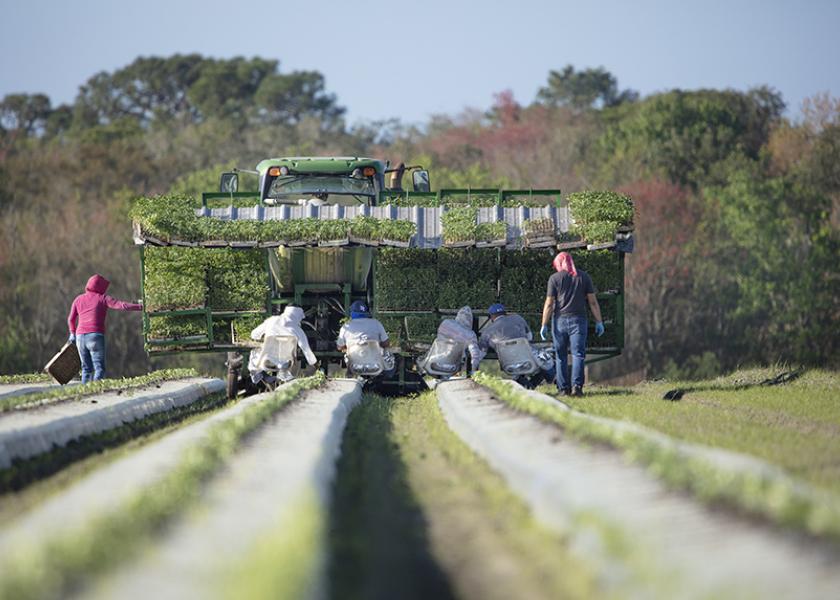Tomato growers grapple with Ian aftermath

The effect of Hurricane Ian will be felt in Florida this fall and winter, but the extent will vary by location.
Overall, Florida’s November tomato crop will be smaller than normal because of the hurricane, but the state will remain a significant supplier through December, according to the Maitland-based Florida Tomato Exchange.
“Early November is when Central Florida’s volume usually begins to ramp up,” said Michael Schadler, the organization’s executive vice president. “That ramp-up is delayed this year because of the impact from the hurricane.”
Although most fields that sustained damage were still producing, the harvest is significantly lighter than normal, he said in early November.
“As November progresses, and as we move into December, we will continually see production increase,” he said.
“The weather has continued to be favorable since the storm, and we’ll be back to full capacity by the end of the year as we move into our winter crop.”
The storm had no effect on tomato production in north Florida, but production in central Florida will be lighter than normal.
The effects of the storm were less severe in southwest Florida, around Naples and Immokalee, and that will help offset reduced volume in central Florida, Schadler said.
The Florida Department of Agriculture and Consumer Services did not have a commodity-specific breakdown of storm damage but reported total crop losses of 10% to 15% in affected counties, with a value of about $154 million to $230.5 million.
Florida growers shipped 608 million pounds of tomatoes in 2021, up from 596 million pounds in 2020, according to the Florida ag department.
Florida produces round, roma, cherry and grape varieties, and 100% are field grown.
Palmetto, Fla.-based West Coast Tomato LLC has fields in Naples and just south of Tampa, and both were affected by Hurricane Ian, said president Bob Spencer.
Fields in the south were very young and seemed to have endured heavier winds, he said.
The company had to walk away from plantings in eastern Manatee County because of damage caused by heavy winds.
“It was in the path of the hurricane,” he said.
The storms will impact volume, especially during the first pickings.
“Normally, we would be running pretty steady right now,” he said the first week of November.
“It will probably be another two weeks before we get to plantings that will allow us to have semi-normal yields.”
He expected West Coast Tomato’s fall crop to be down 50% from last year.
Markets were higher than usual, however, and Spencer was hopeful that they would remain that way for a while.
On Nov. 4, USDA reported that 25-pound cartons of mature green tomatoes from central and south Florida were $32.95 to $33 for 5x6 and 6x6 sizes (up from $18.95 to $23 and $16.95 to $20.95 a year earlier) and $24.95 to $26 on 6x7 sizes (up from $14.95 to $17).
Spencer expected fruit size and quality to improve as the season progresses.
“Right now, there is some fruit on the bushes, but the bushes are stressed from the wind, so they start to give birth to the fruit before the fruit has really sized up,” he said.
The company grows round, roma, and mature green tomatoes.
Quincy, Fla.-based Gadsden Tomato Co. was not affected by the hurricane, said Wade Williams, plant manager.
As a result, demand for the company’s round and roma tomatoes has been up this year.
Volume should be similar to last year, he said.
Picking started Oct. 4 and will continue until shortly after Thanksgiving.
“Quality has been very nice,” Williams said, though picking got off to a slow start because of cool weather in October.
Weather was much warmer in November, he said.
Like other produce companies, Florida tomato shippers are dealing with the effects of inflation.
“Inflation has hit agriculture hard,” Spencer said.
Things like costs of labor, pallets, boxes and inputs all have gone up.
“I’ve never seen inflation like I’ve seen in the last two years,” he said.
“It’s tough to deal with because we are in a supply-and-demand marketing scenario, so we can’t pass these costs on,” he said.
“We’re just trying to figure out what we can do to cut our costs and hold down our costs as much as possible and get through this.”
Williams said he was pleased that Florida tomato prices have been higher than normal, since prices on all inputs have risen.
“The cost of fertilizer is double or triple what it was last year, depending on the type,” he said.
Although labor costs also have risen, Williams said Gadsden Tomato Co. has not had a problem securing an adequate number of workers this season.
“Labor has been a huge problem the last two or three years,” he said, “but it’s gotten a whole lot better this year.”







